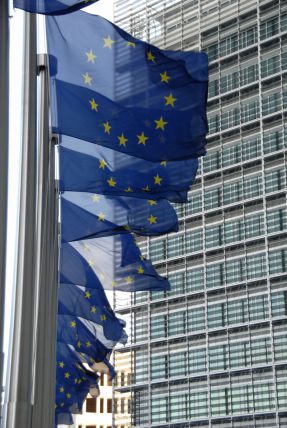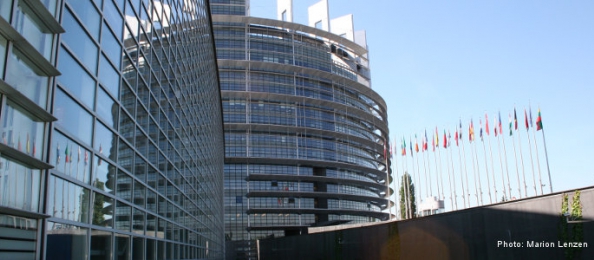How High Is Sustainability on the European Policy Agenda?
Faced with economies still struggling to make ends meet, the European Union’s take on sustainability relies heavily on fundamental industry makeovers for signs of economic recovery.
European policy has a long, detailed record of policy measures to support discussions on required standards to be applied by the business sector. Most measures have been focused on resource efficiency and its implementation, with the ultimate goal being to boost productivity and reduce input use (energy, water, materials) for a given level of economic output, which would incorporate environmental sustainability into the economic growth agenda once and for all. Europe’s policymakers seem to be testing the ground for the hypothesis that businesses are falling short in tapping its resource-efficiency potential, which some studies claim have a savings potential of billions of euros for European industry.
Europe 2020 Strategy at work
The Europe 2020 Strategy may be seen as the main pillar in policymaking supporting Europe’s shift toward a sustainable economy – it is the to-do list of resource efficiency and offers competitiveness in the global arena. At the time of the 2020 Strategy’s adoption in 2011, the EU attempted to put forward green economy development measures against the backdrop of financial turmoil and insecurity in the business sector. Policymakers are putting a stamp on criteria for competitiveness, requiring that businesses ought to increase their use of renewable energies, reduce their greenhouse gas emissions, enhance their resource efficiency, and promote innovation. This comes as no surprise, given the fact that Europe is the largest importer of raw materials and sources of non-renewable energy.
The latest policy developments in this area suggest an increased focus on sustainability as the driver for innovation in the European region, as shown by the 7th Environment Action Program (January 2014), which clearly lists resource-efficiency management as a priority. Being challenged as it is by other regional players regarding manufacturing and extraction volumes, Europe’s winning card could be its favorable climate toward innovation due to its tradition of research and development and producing a well-educated labor force. Complementing its roadmap to resource efficiency – which basically maps Europe’s challenges in its efforts to decouple growth from the extensive use of resources – the European Commission has announced its drafting of a communication on the Circular Economy in 2014. The goal is not to replace the concept of resource efficiency with a more sophisticated one, but rather to highlight a transformative growth model that would radically change both producer and consumer patterns by eliminating waste. The continual flow of resources in the production cycle – as opposed to what is called for in current economic models – would require tremendous innovation efforts to restructure the value-chain systems so as to accommodate a no-waste principle.

Sustainability-driven innovations
Resource efficiency improvements can be compared to a first-tier change of business operations, for example replacing old equipment to save more energy or finding innovative ways to use less water and fewer materials and create less landfill, etc. These are incremental changes most experts would call “picking the low-hanging fruit” because, as the idiom implies, there is little work required to do it, investments are relatively low-cost, and returns on investment are achieved in a short time.
The circular economy model of business, however, is a different matter altogether: It builds upon first-tier changes in the company but implies a complete makeover. Not only will the business change its operations, but it will also change its entire methodology and processes in order to come up with something novel, all while assessing its suppliers, employees, and entire organization to accommodate this makeover. Arguing for this business case involves taking a long-term perspective on return on investment. Success stories in this area have one thing in common: the ambition to take measures in the present to position the business as an industry leader in the future.
The European Commission is as busy as ever surveying small and medium-sized enterprises (SMEs) around Europe, checking for policy impacts on companies’ strategies toward resource efficiency, or issuing policies on corporate reporting requirements. At the same time, it is dealing with the intricate job of harmonizing – or at least attempting to harmonize – its initiatives, roadmaps, action plans, etc., for the sake of cohesiveness.
A survey published in March 2014 put forward a curious finding: 175 respondents to a study done in the SME sector in Europe reported a lack of information and knowledge in implementing resource-efficiency measures, despite the fact that – according to the experts who authored the study – up to 50 percent of a company’s costs come from using resources such as water, energy, and materials. Since resource-efficiency measures are meant to lower the costs of these expenditures, the findings are puzzling. It seems that the majority of European SMEs fall short of being proactive in a matter that affects their revenues, not to mention their environmental footprints.
Academia could contribute toward understanding this conundrum: Researchers have long debated the merits of policy in driving business innovations as a response to social and environmental challenges, yet policy can be a double-edged sword. Policy-making is not an easy game; it is about calibrating economic and political interests, which is challenging enough.
On the one hand, too much of a focus on environmental sustainability measures would hinder business operations through additional costs – costs that might prove to be economically unsustainable – and would undoubtedly attract unwanted lobbying against these measures. On top of that, it is no easy task to quantify the economic benefits acquired in the process of implementing resource-efficiency measures. However, as this study revealed, the information asymmetry reported here is costing the European industry €630 billion each year. No wonder policymakers would like these costs to be turned into savings. But how to avoid a situation in which the regulations become too strict?
On the other hand, too little focus will send mixed signals to the market, giving the impression that the sustainability agenda has not been promoted to the grownups’ table (CFOs and CEOs), which is a common view, even in environmentally-conscious business cultures, such as the one in Denmark. A case in point here is the latest decision on corporate reporting (Feb. 2014), in which listed companies in Europe with more than 500 staff (approximately 5,000 companies in Europe) are obliged to report specifically on, among other things, environmental issues.
Corporations need to abide by the rule of disclosing their due diligence policies (mechanisms to identify, prevent, mitigate, and account for negative impacts), and their reporting will have to include supply chain issues. Critics, however, have pointed out the loopholes that limit the effects of this reform, as corporations may exempt themselves from disclosing sensitive information. The choice of reporting standards and indicators also seems to be too flexible, making it difficult to use a benchmark. And, of course, there are no sanction mechanisms in place. One could say these regulation attempts are better than nothing, but I say that, at the rate things are getting done, 2020 is an unrealistic target.
The Commission will need to dust off its strategy of pushing things onto the governance agenda if Europe is to become a competitive economic force in due time. The changes needed are of a systemic nature, and even if the business sector is at the heart of our economic recovery, turning the European economy into a circular one takes a multistakeholder approach. Consumers and civil society need to be equally engaged to support such an industry makeover.
Big questions remain
Is policy – soft policy, that is – the right driver to push the European industry to change its ways? The answer I would give is that hard policy is certainly not the right driver, as it would never get that far. Talking money in a crisis climate could do the trick, though. This is probably why the Ellen MacArthur Foundation’s project on the Circular Economy seems to be the only model embraced by all stakeholders in this discussion – because it talks about concrete economic targets.
One major aspect not to be overlooked is the fact that it is as much about changing the way businesses impact the social and environmental aspects of our society as it is about changing their mentality about making money. Sustainability does not really work as an add-on to what they are already doing, and quite soon policies will be put in place to remind them of this.
Last but not least, another factor slowing down the process is the unnecessary emphasis on denominations used in the issue of sustainability measures. Sustainability is as much the producers’ responsibility as it is the consumers’ when they spend their money. Until the consumer case story advances to the front page of this issue, the pace at which things improve will be up to industries and policymakers.
It is about time more people contributed toward decision-making. What is your take on this?
Elena Mocanu has been a researcher on green business model innovations for Worldwatch Institute Europe since 2012. Additionally, she has worked as consultant on resource efficiency for the Copenhagen-based European Topic Center (Copenhagen Resource Institute).
About Us // Privacy Policy // Copyright Information // Legal Disclaimer // Contact
Copyright © 2012-2018 macondo publishing GmbH. All rights reserved.
The CSR Academy is an independent learning platform of the macondo publishing group.









